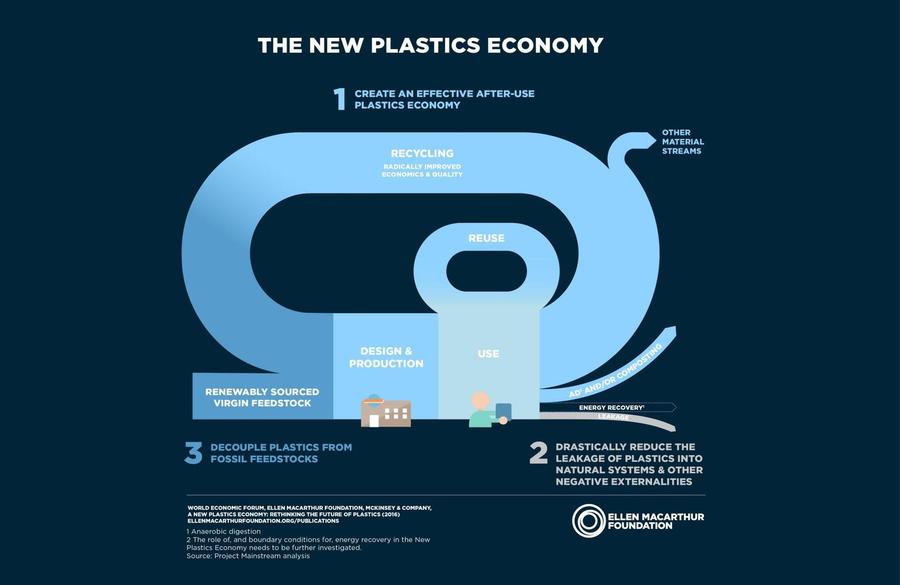Difference between revisions of "The new plastics economy"
Gaspardbos (talk | contribs) (Created page with "{{Article |Subtitle=sustainable (new earth) graphic design |Image=plasticseconomy.jpg |Summary=Applying circular economy principles to global plastic packaging flows could tra...") |
Rümeysa Önal (talk | contribs) |
||
| Line 24: | Line 24: | ||
{{Category selector | {{Category selector | ||
|Category=Graphic Design | |Category=Graphic Design | ||
| + | }} | ||
| + | {{Category selector | ||
| + | |Category=Economy | ||
}} | }} | ||
{{Articles more}} | {{Articles more}} | ||
Latest revision as of 16:25, 31 October 2018
Contents
The wikipage input value is empty (e.g. SomeProperty::, [[]]) and therefore it cannot be used as a name or as part of a query condition.
Applying circular economy principles to global plastic packaging flows could transform the plastics economy and drastically reduce negative externalities such as leakage into oceans, according to the latest report by the World Economic Forum and Ellen MacArthur Foundation, with analytical support from McKinsey & Company.
The New Plastics Economy: Rethinking the future of plastics provides for the first time a vision of a global economy in which plastics never become waste, and outlines concrete steps towards achieving the systemic shift needed. The report, financially supported by the MAVA Foundation, was produced as part of Project MainStream, a global, multi-industry initiative that aims to accelerate business-driven innovations to help scale the circular economy.
The new report acknowledges that while plastics and plastic packaging are an integral part of the global economy and deliver many benefits, their value chains currently entail significant drawbacks. Assessing global plastic packaging flows comprehensively for the first time, the report finds that most plastic packaging is used only once; 95% of the value of plastic packaging material, worth $80-120 billion annually, is lost to the economy. Additionally, plastic packaging generates negative externalities, valued conservatively by UNEP at $40 billion.[1] Given projected growth in consumption, in a business-as-usual scenario, by 2050 oceans are expected to contain more plastics than fish (by weight), and the entire plastics industry will consume 20% of total oil production, and 15% of the annual carbon budget.[2]
In this context, an opportunity beckons for the plastics value chain to deliver better system-wide economic and environmental outcomes, while continuing to harness the benefits of plastic packaging. The New Plastics Economy, outlined in this report, envisages a new approach based on creating effective after-use pathways for plastics; drastically reducing leakage of plastics into natural systems, in particular oceans; and decoupling plastics from fossil feedstocks.
Achieving such systemic change will require major collaboration efforts between all stakeholders across the global plastics value chain – consumer goods companies, plastic packaging producers and plastics manufacturers, businesses involved in collection, sorting and reprocessing, cities, policymakers and NGOs. The report proposes the creation of an independent coordinating vehicle to set direction, establish common standards and systems, overcome fragmentation, and foster innovation opportunities at scale. In line with the report’s recommendations, the Ellen MacArthur Foundation will establish an initiative to act as a cross-value-chain global dialogue mechanism and drive the shift towards a New Plastics Economy.
The report’s findings are timely: knowledge and understanding of the circular economy among business leaders and policymakers is growing, as demonstrated by the European Commission’s recent circular economy package and associated funding announcements; new technologies are unlocking opportunities in material design, reprocessing and renewable sourcing; developing countries are investing in after-use infrastructure; and governments are increasingly considering – and implementing – policies around plastic packaging. The New Plastics Economy: Rethinking the future of plastics provides a fact-base and a vision to inform the choices that need to be made.Links
CONTRIBUTE
Feel free to contribute to Beyond Social.









